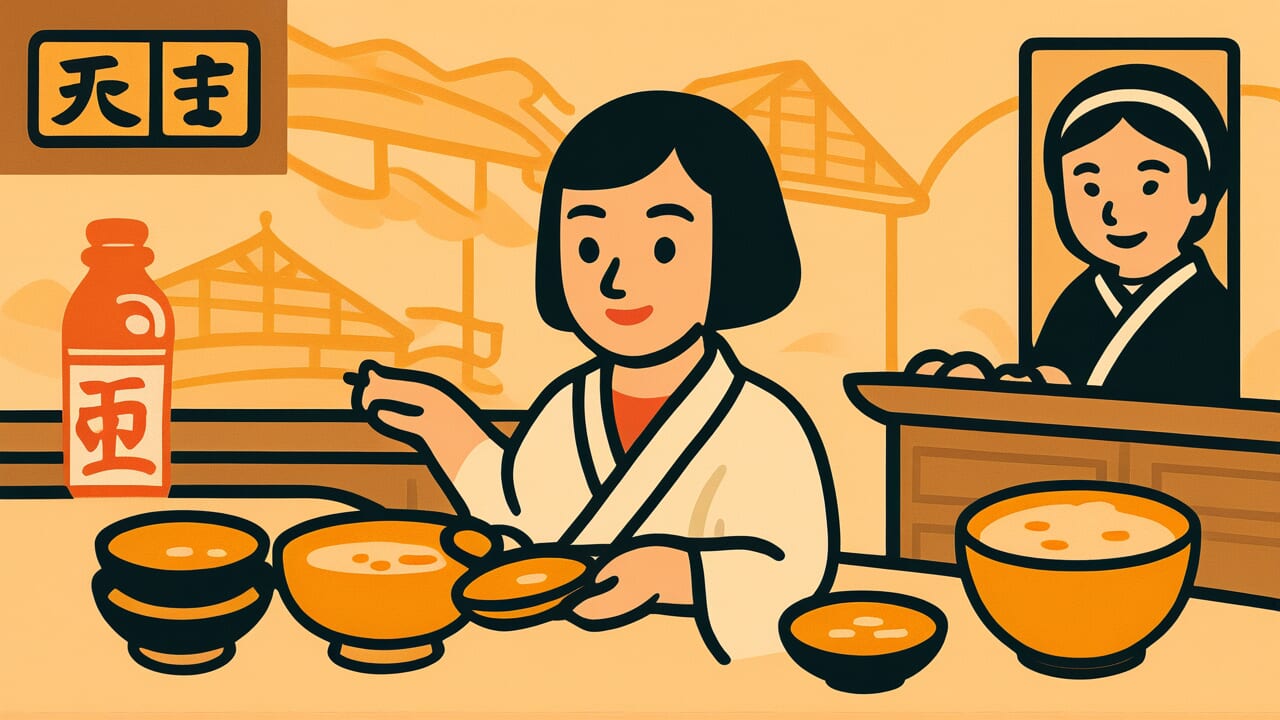How to Read “A courtesan buyer’s rice bran miso soup”
Keisei kai no nukamiso shiru
Meaning of “A courtesan buyer’s rice bran miso soup”
“A courtesan buyer’s rice bran miso soup” means living in poverty because you spent money on luxuries beyond your means.
It describes someone who wastes money on expensive courtesans called keisei. After such reckless spending, they become so poor that they can only afford miso soup made with rice bran.
This proverb warns against spending money for temporary pleasure or vanity. When you buy expensive things without considering your income or position, your daily life suffers.
People use it to criticize or mock someone who splurges at fancy places but struggles with everyday expenses. It can also be used self-mockingly.
Even today, people still fall into poverty from spending beyond their means. The lesson of this proverb remains relevant in modern times.
Origin and Etymology
The exact origin of this proverb is unclear. However, it likely came from common life and pleasure quarter culture during the Edo period.
“Keisei” originally came from a Chinese story meaning “a beauty who could topple a nation.” In Japan, it became the term for high-ranking courtesans in pleasure quarters.
Spending time with a keisei required enormous amounts of money. One night could cost several ryo, which was several months’ living expenses for common people.
“Rice bran miso soup” represents extremely humble food. Rice bran is the outer layer removed when polishing rice.
Instead of proper rice and hearty miso soup, you could only afford poor soup with just rice bran. This showed extreme poverty.
The proverb combines these two contrasting images. It shows how extravagant spending beyond your means leads to daily hardship.
The core message lies in this gap: one glamorous night at the pleasure quarters, followed by days of miserable meals at home.
Interesting Facts
In Edo period pleasure quarters, visiting a keisei-class courtesan required more than just the base fee. You also paid teahouses and gave tips.
One visit could consume several months of a craftsman’s income. Many men ruined themselves financially this way.
Rice bran miso soup was actually made in poor households. Rice bran contains nutrients, so it served as a valuable food source when rice was unaffordable.
Still, it was far inferior to real rice. It was merely a substitute food.
Usage Examples
- I bought a luxury car on loan, but now monthly payments leave me broke. This is exactly “a courtesan buyer’s rice bran miso soup.”
- I kept buying brand-name goods until my savings ran out. Now I’m living “a courtesan buyer’s rice bran miso soup” this month.
Universal Wisdom
“A courtesan buyer’s rice bran miso soup” has been passed down because it addresses an eternal theme: the gap between human desire and reality.
Everyone yearns for glamorous worlds beyond their means. Edo period commoners were captivated by the brilliance of pleasure quarters.
Modern people are drawn to luxury brands, expensive cars, and lavish trips. The essence is the same.
This proverb shows the difficulty of balancing immediate satisfaction with long-term happiness. This choice constantly faces humanity.
Immediate desires feel intense and demand instant fulfillment. But the price gradually erodes your daily life afterward.
The memory of one glamorous night remains, but the poverty of your daily meals never disappears.
Interestingly, this proverb doesn’t simply recommend frugality. It doesn’t deny the existence of keisei courtesans.
Rather, it acknowledges their appeal while teaching the importance of knowing your place. Human desire cannot be denied.
That’s why we need wisdom about how to handle it. Our ancestors saw both human weakness toward desire and the reality of having to keep living.
When AI Hears This
After the huge expense of redeeming a courtesan, even daily rice bran miso soup feels regrettable. Behavioral economics reveals the distortion in human value judgment here.
According to prospect theory, humans perceive value not by absolute amounts but by changes from a reference point.
For example, 10,000 yen feels completely different right after gaining 1 million yen versus having nothing. The key is that the value function curves gently on the gain side but drops sharply on the loss side.
This means the pain of losing feels about 2.25 times stronger than the joy of gaining.
The interesting aspect of this proverb is how the huge expense of redemption suddenly raises the reference point.
You imagined a glamorous life with the courtesan, but reality is humble rice bran miso soup. This gap registers as loss, creating psychological damage beyond the actual amount.
Someone who spent 100 ryo on redemption regrets spending a few mon on rice bran soup. This isn’t about the amount itself.
The brain overvalues the loss of downward deviation from expected value.
After major decisions, humans become especially sensitive to gaps with trivial reality. This cognitive distortion overlaps with modern behavior patterns of excessive economizing on daily expenses after large purchases.
Lessons for Today
This proverb teaches us the importance of knowing our means and designing sustainable lives.
Today, we see others’ glamorous lives on social media more than ever. You might feel tempted to show off or want similar experiences.
But sacrificing daily stability for momentary brilliance ultimately makes you suffer.
The key isn’t completely suppressing desire. It’s having wisdom to choose truly valuable things within your income and circumstances.
Occasional luxury adds color to life. But when it crushes your daily living, you’ve missed the point.
You can start today. Before making big purchases, ask yourself if you truly need them.
Imagine concretely what your life will be like after paying. A rich daily table matters more than one glamorous moment for your long-term happiness.
A grounded life is the true path to prosperity.



Comments